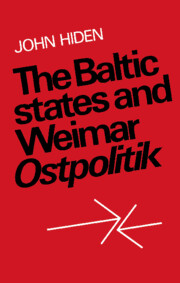Book contents
- Frontmatter
- Contents
- Introduction
- PART I THE POLITICS OF PEACEMAKING 1919–20
- PART II TRADE AND FOREIGN POLICY 1921–3
- 3 The springboard concept
- 4 The politics of provisional trade treaties
- PART III WEIMAR REVISIONISM AND BALTIC SECURITY 1923–33
- CONCLUSIONS
- Map
- Tables
- Abbreviations
- Notes
- Bibliography
- Index
4 - The politics of provisional trade treaties
Published online by Cambridge University Press: 22 September 2009
- Frontmatter
- Contents
- Introduction
- PART I THE POLITICS OF PEACEMAKING 1919–20
- PART II TRADE AND FOREIGN POLICY 1921–3
- 3 The springboard concept
- 4 The politics of provisional trade treaties
- PART III WEIMAR REVISIONISM AND BALTIC SECURITY 1923–33
- CONCLUSIONS
- Map
- Tables
- Abbreviations
- Notes
- Bibliography
- Index
Summary
Wirth's attempt to make more acceptable to German opinion the pursuit of his major policy goal, a reparations settlement with the Allied Powers, received a severe setback with the London Ultimatum of 5 May 1921 and the scale of payments which Germany had to accept. Later, in October, came the Allied decision to partition Upper Silesia; it was felt in the Reich that this favoured Poland, for which country Wirth had no love. The event increased the domestic opposition to Wirth's strategy of securing Allied concessions through fulfilling the terms of the peace treaty. By contrast, the crisis bringing down Wirth's first administration in October 1921 revealed beyond question the existence of a broad band of support in German public and private life for consolidation of relations with Russia. The political–economic basis of what has been termed the ‘Rapallo lobby’ spanned industry of all types and particularly heavy industry; it included self-evidently the parlimentary opposition to fulfilment, centring on the DVP and DNVP; it attracted military leaders like von Seeckt. These groups shared a profound resentment of the Western powers. As an alternative to fulfilment they unrealistically preached the defiant use of contacts with Russia as an instrument of Weimar foreign policy. In this respect at least, the decision of Wirth's second administration, from October 1921, to put more emphasis on the pursuit of a political agreement with Russia, was assured of nationalist backing – an important consideration in view of the difficulties the Chancellor had experienced in holding his coalition together.
Personnel changes in the Auswärtiges Amt clearly signalled the shift in priorities.
- Type
- Chapter
- Information
- The Baltic States and Weimar Ostpolitik , pp. 93 - 118Publisher: Cambridge University PressPrint publication year: 1987



